|
Life during the class-conscious interwar years was so very different to life as we know it today. These memories from Margaret Bradshaw (nee Rhodes), whose father was a gentleman of private means, serve to illustrate the point, and make interesting reading.
I was born in 1920 in the village of Grindleford, Derbyshire. I was the youngest of four and was well into childhood before a schoolmate told me that my oldest brother and sister had a different mother from mine. My mother confirmed it, and said in effect it was nothing to worry about, so I didn't. Their mother had died in, or shortly after childbirth, and a photograph of her, with two lovely borzoi dogs, was among the many family photos on our dining room walls. Now I knew who she was.
I went to a local private school at the age of five and recall being taught arithmetic with bead frames. I could already read (taught by mother while still in my highchair after breakfast, while my father read the Daily Sketch). He was almost totally detached from our welfare, except for his concern that we should pass a motion each morning before school (we occasionally lied about this) and that he, being the only member of the family with false teeth, was costing a lot less than our six-monthly dentist bills. Fortunately my mother, who still had her own teeth, took the opposite view.
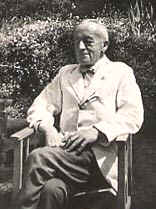
My father, James Spencer Rhodes, in our garden at 'Summer Hill', Grindleford, about 1934.
|
Our next-door neighbours were (to me) old fogies. Miss Gilliatt (more about her later) objected to our retrieving tennis balls from her garden, and after one memorable birthday party held in our garden, food had been thrown over the hedge. She collected it and gave it back to my mother, saying that the next tramp that knocked on the door would be grateful for it. We had frequent calls from tramps, many of whom walked ten miles from Sheffield, with wives and babies in prams, in the hope of begging for food and a 'mashing' of tea at the back doors of houses in our fairly affluent village. Our maid Jinnie used to come and ask if she should give them anything, and usually they got a mashing of tea, milk for the baby, and several slices of bread and dripping. We always had several basins of dripping on the go, as my father liked meat at every meal. Toast and dripping was one of my favourite tea meals, or bread dipped in hot bacon fat at breakfast time. I couldn't eat fat meat as such, and still can't!
Our neighbours on the other side were two sisters and the husband of one of them. They later went to live in Bournemouth, and we met them there when we went on holiday. One of them drove a Lancaster, a wonderful huge car to us. My father bought himself an Austin 7 in 1930, but the rest of the family continued to use the railway, which was five minutes walk, or two minutes sprint, from our house. I lived in fear of 'missing the train' which is with me still, as my family liked to time it onto the platform as the train came in, for we could see its plume of smoke from our dining room window as it came round the bend, our signal to rush out.
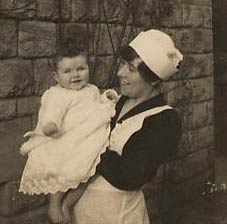
Our maid Jinnie French holding me as a baby in 1920.
|
My mother invited Miss Gilliatt to share a taxi with her and my father and Jinnie, to vote at the polling station in the next village. This must have been for a general election in the thirties. Jinnie told me that Miss Gilliatt said to her 'Jane, you know that you must put your cross against the Marquis of Hartington's name'. Jinnie nodded respectfully but, as she told me afterwards, voted for 'the Labour man'. It wasn't until 1945 that 'the Labour man' overturned a conservative majority going back for generations, causing outrage amongst people like my father.
Chatsworth House, the home of the Duke of Devonshire was about ten miles away and we often cycled round Chatsworth Park and the village of Edensor where all the servants of the estate lived. As children we cycled freely to all the neighbouring villages, but a recent visit to the Peak District National Park, as it now is, showed me that nowadays it would be impossible for children to cycle on these crowded roads.
My friend Mavis Marshall was about the youngest of four children but her mother died when Mavis was about five years old. Though she had three elder sisters Mavis was mostly left to her own devices and at seven years of age, she suffered an illness that the Doctor said was a nervous breakdown. Mavis had to stay in bed for a month and I used to go and keep her company. She seemed quite well to me.
Her father owned the Sheffield Vinegar Company. Vinegar was brewed in those days, and wooden barrels of it filled a yard behind his office. He liked to take us for rides in his big limo and later to the pictures at Bakewell (where the tarts are made). One evening the usherette came and asked us to move from the front row of the circle as the Duke of Devonshire's family were coming to see the film. So we sat behind them. The rights of the upper class to preferential treatment seemed to be taken for granted in those pre-war days, although my mother taught us to show respect for everyone, even the tramps!
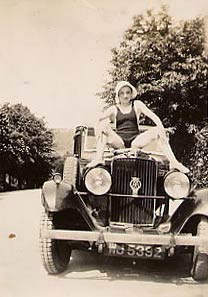
My best friend Mavis Marshall on the bonnet of her father's car, about 1930.
|
I had many school friends, but only one who lived near enough to 'play out' with or stay to tea, Mavis, usually on Sundays. Winters were pitch dark in the country but I never remember a moment's boredom, for after homework was done there were books to be read, and re-read, card games to play, wireless (from 1930 onwards) - a huge treat, for Children's Hour and Henry Hall and his orchestra. I remember hearing a broadcast from the USA in which it was announced that Roosevelt had been elected president.
We lived in very beautiful countryside with moorland walks. Woodlands and country lane were all around and provided alternative routes to school and the village shops. Butchers, fishmongers and greengrocers all delivered on specific days of the week, calling once for the order, and again to deliver. Milk was delivered twice a day, likewise post. Sometimes we received by post, as a present to my father, a dead pheasant, rabbit or hare with a label round its neck.
I was aged six when a total eclipse of the sun took place at about 6 am. My family all rose and went to the nearest vantage point, a place called the Jubilee Rock (I don't know why). As I was asleep when they left, they decided not to wake me. Our maid lived in, but I think she went too, on this occasion. I was bitterly disappointed in them and the jokes that I would be eighty years old before the next eclipse. (Sad to say, I also missed the eclipse in 1999 as our skies were full of low cloud - too bad).
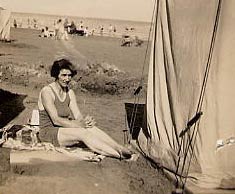
My mother on the beach at Filey about 1930 showing the canvas tent on a wooden base.
|
We took an annual holiday at Filey on the Yorkshire Coast, for the second half of August, staying at Miss Craven's boarding house. My father took an early morning bathe, walking through the town to the seashore in his dressing gown. My mother bathed with us later in the day according to the tides. Bathing huts were drawn on 'sledges' down to the sea by carthorses, and back when the tide came in. Imagine three of us drying and dressing ourselves in one little canvas hut with waves lapping round the edges and the man and his horse waiting to drag our hut up the beach!
Jinnie French, our maid, came on holiday with us and accompanied us to the beach and on walks through the cornfields after tea. She still wore a uniform on holiday and only the front of her V-neck got sunburned. She was extremely modest and would have lain down her life rather than have to put on a bathing costume. But I loved her dearly. She was with us for seventeen years before announcing with a scarlet face that she was leaving to marry the gardener. I helped her choose a wedding costume, and the gardener still came to us once a week and gave us news of Jinnie who now lived in Hathersage, the next village, where the gardener had a council house with, of course, a lovely garden.
Every Sunday morning special trains were run from Sheffield to bring 'hikers' to Derbyshire. As we walked to church on Sunday mornings the road was packed right across its width with people in walking boots and haversacks. Youths on bicycles used to thread through the crowds and once I was knocked down by one and received a deep cut in my leg. His bike had no brakes, and he looked very thin and poor. I think I felt more sorry for him than myself, as instead of church, my mother took me to the Doctor's house and we waited a long time for the Doctor, who had a reputation for drinking too much in the pub, to pull himself together. I had a fortnight off school and my leg slowly healed, by daily visits from the Doctor.
Of course this was long before antibiotics and he had inserted a rubber tube into the wound, and pressed out fluid on his daily visits, as there had been a lot of rust from the bicycle in it. I remember this so well because we were seldom if ever ill except for measles, mumps and German measles, none of which, as I remember, merited a visit from the Doctor. Jinnie's parents used to visit the Doctor's surgery as they were 'on the panel' and didn't have to pay. Jinnie told me how different the Doctor was towards his panel. Once her mother had to go to hospital in Sheffield and Jinnie told me that the patients were given tea in a jam jar and bread and jam at every meal. If the visitors brought eggs they were given to the staff and never seen again by the patient. As far as I can remember, she told me these things in a factual way, as class differences seemed to be widely accepted in my world.
I must have been seven years old when the General Strike took place but I remember nothing of it. It wasn't until I read, 'I was one of the unemployed' by a wartime friend of mine, and published after the war by Gollancz that I realised what a charmed life I must have led through the twenties and thirties. This was my first experience of a book that I 'couldn't put down' and I spent all of one night reading it.
When war broke out I had already completed my first year at Sheffield University reading French and Spanish. The Spanish professor was a Fascist and the Senora Lecturer was republican. They used to confront each other in the Spanish department, verbally fighting the civil war, while we waited for our lecture from one or other of them. Language students were encouraged to spend the summer of the second year in France, and hopefully attend lectures there. As the phoney war seemed to be going on forever, in April 1940 several of us set out for Paris and a course at the Sorbonne. Parisians were convinced that Hitler's target would be England, and they took a very relaxed attitude towards food rationing and the blackout.
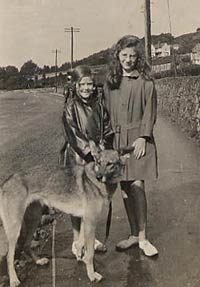
My elder sister Jo and I with my brother's dog on the road we walked to school, about 1927.
|
In our digs, an old fashioned house built round a courtyard, with a concierge keeping charge of the huge outer gate, was a journalist on the Paris Daily mail, who kept us informed about the war.
We also made friends with a young man who worked at the British Consulate and these two promised to tell us when we should leave for home, it being perfectly obvious to them (but not to most Parisians) that Hitler was on his way. Eventually, on June 7th 1940, it was time to go, and our friends got us tickets on the last train to a channel port (un-named) where we arrived that evening at what turned out to be St. Malo. The next day we sailed for Southampton, the ship zigzagging all the way to avoid mines. When our respective families met us on Sheffield station we began to realise what an anxious time they had been having, and we found that we literally were the last to leave Paris, before the Germans arrived.
Recently, I went back to Grindleford while staying with relations, who now live in Sheffield. The road that I walked to school and back twice a day is now a busy main road. Nobody now would let a child walk on it unaccompanied. The house where we lived is still the same, only different. The name is unchanged, but the garden is full of free-range hens and several dogs. The current owner-occupiers were friendly and interested to meet me, and asked many questions about the origin of the house and previous occupants. I found it a disturbing experience, re-visiting my childhood home, and memories came flooding back. In general, then, I don't recommend it to old people. Better to get the brochures and visit somewhere new!
| |


